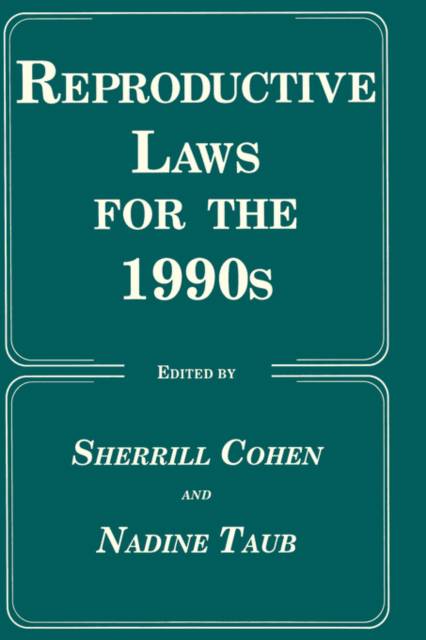
- Retrait gratuit dans votre magasin Club
- 7.000.000 titres dans notre catalogue
- Payer en toute sécurité
- Toujours un magasin près de chez vous
- Retrait gratuit dans votre magasin Club
- 7.000.0000 titres dans notre catalogue
- Payer en toute sécurité
- Toujours un magasin près de chez vous
Description
The Project on Reproductive Laws for the 1990s began in 1985 with the realization that reports of scientific developments and new technologies were stimulating debates and discussions among bioethicists and policymakers, and that women had little part in those discussions either as participants or as a group with interests to be considered. With the help of a planning grant from the Rutgers University Institute for Research on Women, the Women's Rights Litigation Clinic at Rutgers University Law School-Newark held a planning meeting that June attended by approximately 20 theorists and activists in the area of reproductive rights. Project purposes, methods, and general shape took form at the meeting. Two goals have characterized the Project's work since then: first, to generate discussion, debate, and, where possible, consensus among those committed to reproductive autonomy and gender equality as to how best to respond to the questions raised by re- ported advances in reproductive and neonatal technology and new modes of reproduction; and second, to ensure that those shaping reproductive law and policy appreciate the ramifications of these developments for gender equality. In meeting this twofold agenda, the Project focused on six areas: time limits on abortion; prenatal screening; fetus as patient; reproductive hazards in the workplace; interference with reproductive choice; and alternative modes of reproduction. The Project identified individuals to take respon- sibility for drafting model legislation and position papers in the six areas (for the drafters, see the Appendix).
Spécifications
Parties prenantes
- Auteur(s) :
- Editeur:
Contenu
- Nombre de pages :
- 472
- Langue:
- Anglais
- Collection :
Caractéristiques
- EAN:
- 9780896031753
- Date de parution :
- 23-12-88
- Format:
- Livre broché
- Format numérique:
- Trade paperback (VS)
- Dimensions :
- 156 mm x 231 mm
- Poids :
- 648 g

Les avis
Nous publions uniquement les avis qui respectent les conditions requises. Consultez nos conditions pour les avis.






